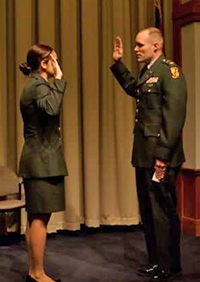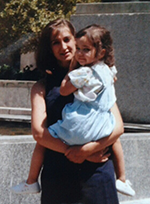A stack of reports that sits in her outbox mirrors the stack of textbooks she uses for the nursing courses she takes in the evening. Capt. Elena Gonzalez, the deputy state surgeon for the Ohio National Guard, has a full schedule by any measure. You wouldn’t know it from the smile on her face as she describes her military service.
“I feel like the military was something that was always ingrained in me,” Gonzalez said. “I have a grandfather on my mom’s side that is a Korean War veteran, and on my father’s side, my grandfather was a lieutenant colonel in the Spanish army. The military is where you can truly push yourself and see how far you can go,” Gonzalez added, “…to be amazed at the things you can do.”
 |
Cadet Elena Gonzalez (left) receives her commission through the University of Toledo Army ROTC program. |
After going through ROTC at the University of Toledo and graduating with her bachelor’s degree, Gonzalez received her commission and planned to go to pharmacy school. Plans changed, however, and Gonzalez found herself deployed to Baghdad, Iraq with the 16th Engineer Brigade in 2009.
 “The military has given me a lot of opportunity,” Gonzalez added. “I’ve had some great mentors to advise me. It has given me opportunities to define myself as a person and to find what I need to be fulfilled.” “The military has given me a lot of opportunity,” Gonzalez added. “I’ve had some great mentors to advise me. It has given me opportunities to define myself as a person and to find what I need to be fulfilled.”
Gonzalez, who has served eight years in the Ohio Army National Guard, works as the advisor to the command for medical resources, helping to develop medical programs and share best practices across the force.
“Being able to take care of Soldiers is the best part of the job. You have to care about this job or else why are you doing it,” Gonzalez said. “I want to make sure we are taking care of Soldiers.”
Gonzalez’s drive to improve the medical care of Soldiers doesn’t end when she leaves work. Currently enrolled in nursing school, she is working toward becoming a registered nurse.
“Eight years ago I knew I wanted to go into the medical profession,” Gonzalez said. “I knew I wanted to help people. I feel like my purpose in life is to be there for people in their critical times of need.”
 |
Elena Gonzalez (right) with her aunt, Maria Jesus Gonzalez Sanchez, during a Family visit to Salamanca, Spain in 1988. |
Growing up in a household where both Spanish and American cultures were intermixed, multiculturalism was the norm. Her mother met her father in Spain during a college trip to Europe. After a long distance relationship, he moved to Ohio where they were married.
“My father would speak Spanish and my mother English,” Gonzalez noted. “I was bilingual before I knew what bilingual was. We would celebrate the Spanish holidays and have the traditional meals one day and the American holidays and food the next.”
With a combination of Spanish and English being the norm for communication, Gonzalez did run into issues in elementary school. “I could speak “Spanglish” at home and both my parents could understand me. It took me a while to realize that I needed to use English with my teacher.”
During her adolescence, other children sometimes made fun of Gonzalez and her Family’s mixture of traditions, which confused the young girl.
“I didn’t understand many of the cultural differences growing up,” said Gonzalez. “I didn’t realize how special my childhood was until I got older. Growing up, nothing was unusual. Most of the year we would be in Ohio and we would spend summers in Spain and so everything was ‘normal.’”
Gonzalez brings that same spirit of accepting anything and everything to her work and her leadership.
“My definition of diversity is seeing what makes someone an individual and what their experiences are. It’s about what makes them who they are. So including people and bringing those things together is what inclusion is. It is my responsibility as a leader to make sure my Soldiers are included and feel like the organization values them.”
|